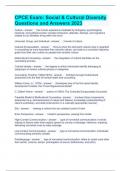CPCE Exam: Social & Cultural Diversity Questions and Answers 2023
Culture - answer the human experience mediated by biological, psychological, historical, and political events; includes behaviors, attitudes, feelings, and cognitions related to our identities living within the word
Universal, Group, and Individual - answer 3 levels of culture
Cultural Encapsulation - answer Occurs when the dominant cultural view is regarded
in counseling as more important than minority values; can lead to a counselor imposing goals from their own culture on people from another culture
Multicultural Counseling - answer the integration of cultural identities w/i the counseling process
Cultural identity - answer the degree to which individuals identify belonging to subgroups of various cultural groups or categories
Counseling Timeline: 1960s/1970s - answer Scholars brought multicultural awareness into the field of mental health and counseling
William Cross, Jr., 1970s - answer Developed one of the first racial identity development models, the "Cross Nigrescence Model"
C. Gilbert Wrenn - answer author of 1962's The Culturally Encapsulated Counselor
Tripartite Model of Multicultural Counseling - answer involves three components: awareness (e.g. self-awareness of values and biases), knowledge (understanding of client's worldview), and skills (intervention in a culturally appropriate manner)
Etic - answer viewing a culture from an outsider's point of view
Emic Perspective - answer insider's perspective; viewing from inside
High-Context Communication - answer type of nonverbal communication: involves relying on factors other than explicit speech to convey a message; inference, implying, delivering nonverbal cues to relay message
Low-Context Communication - answer type of nonverbal communication: individuals communicating primarily verbally
Paralanguage - answer type of nonverbal communication: refers to verbal cues other
than words; (volume, tempo, prolongation of sound, disfluencies, and pitch) Kinesics - answer type of nonverbal communication: involves postures, body movements, and positions; i.e. facial expressions, eye contact and gazes, and touch.
Chronemics - answer type of nonverbal communication: how individuals conceptualize and act toward time (monochromatic/polychromatic time)
Monochromatic Time - answer refers to an orientation toward time in a linear fashion (schedules, advanced planning of activities)
Polychromatic Time - answer refers to the value of time as secondary to relationships among people
Proxemics - answer type of nonverbal communication: the use of personal physical distance
Intimate distance, personal distance, social distance, and public distance - answer 4 interpersonal distances "zones"
Acculturation - answer the process by which an individual makes sense of a host culture's value system in relation to his or her own
assimilation model, separation model, integration model/biculturalism, marginalization model - answer four main models of acculturation
Assimilation Model - answer model of acculturation - where highly acculturated individuals identify solely with the new culture and adopt values and customs of the other, more dominant group
Separation Model - answer model of acculturation - individuals refuse to adapt to cultural values outside of their own cultural values
Integration Model/Biculturalism - answer model of acculturation; individuals identify with both their own culture and that of the host culture
Marginalization Model - answer model of acculturation; individuals reject the cultural values and customs of both cultures
Worldview - answer individuals' conceptualization of their relationship with the world
Locus of Responsibility - answer the focus of responsibility for one's position in life, be it internal feelings of responsibility or external, societal responsibility
Internal Locus of Responsibility - answer refers to the idea that success or failure is viewed as an individual's own doing and is thus the result of individual systems External Locus of Responsibility - answer refers to the notion that the social environment or external system is responsible for what happens to individuals
Locus of Control - answer the degree of control individuals perceive they have over the environment
Internal Locus of Control - answer the belief that consequences are dependent on an
individual's actions
External Locus of Control - answer the perception that chance or outside forces beyond your personal control determine consequences
IR-IC; IR-EC; ER-IC; ER-EC - answer 4 worldview combinations
Human nature; relationship to nature; Sense of time; activity; social relationships - answer 5 components that integrate into various cultures to create unique cultural worldviews
Human Nature - answer component of worldview; involves continuum that humans are basically good, bad, or both good and bad
Relationship to Nature - answer component of worldview; how individuals view the power of nature: harmony with nature, power over nature, or power of nature.
Sense of Time - answer component of worldview; Relates to what aspect of time individuals focus on -- past, present, or future
Activity - answer component of worldview; how self-expression occurs for individuals;
can include being, being-in-becoming, and doing
Social Relationships - answer component of worldview; involve 3 categories that relate to the degree of hierarchy and group focus within a culture: lineal-hierarchy, collateral-mutual, and individualistic
lineal-hierarchal - answer category of social relationships worldview; traditional cultures w/ hierarchal positions, typically patriarchal structures
collateral-mutual - answer category of social relationships worldview; collectivistic focus
Individualistic - answer category of social relationships worldview; the needs of groups are secondary to those of individuals
Race - answer describes how groups of people are thought to be identified by physical characteristics, such as a person's skin color, facial features, hair texture, or eye shape




